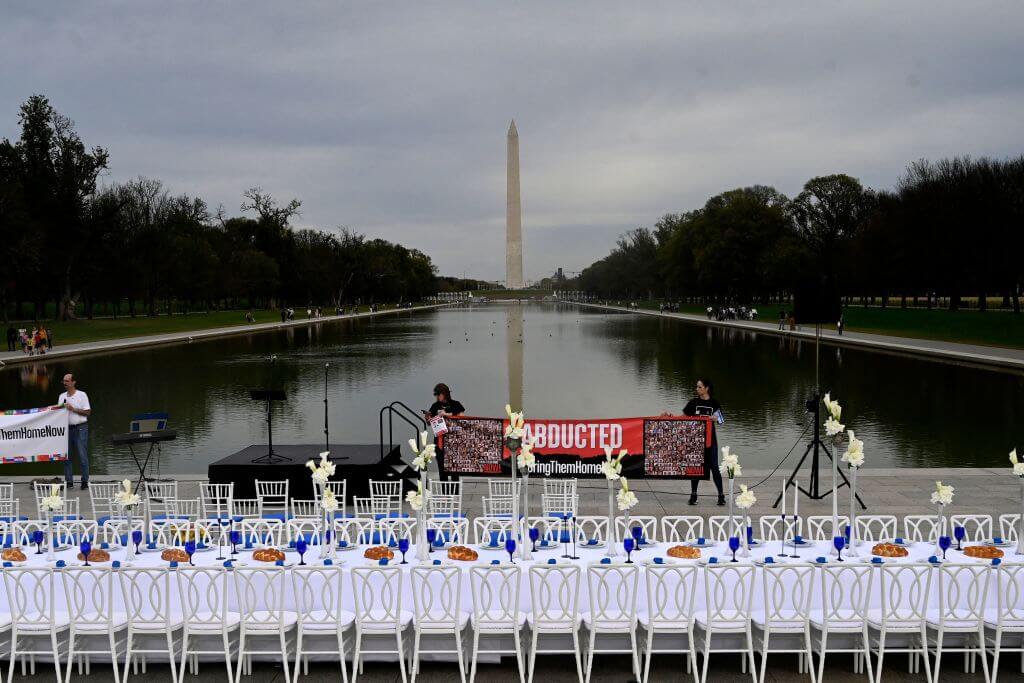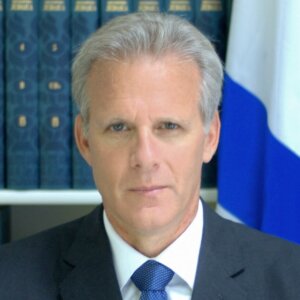When you discuss antisemitism this Thanksgiving, do not mince words
We have to fight Jew-hatred in the classroom, in the workplace and in the media

A Shabbat dinner table with 200 empty seats representing the Israeli hostages, at the Lincoln Memorial in Washington, DC, on October 27, 2023. Photo by Getty Images
Last year at this time I wrote an article in the Forward headlined “Antisemitism is still on the menu this Thanksgiving.” It was actually about my family’s 2020 Thanksgiving dinner in New Jersey, when Jew-hatred became a principal topic around the table.
This year, as we approach the holiday amid the devastating war between Israel and the terror group created to destroy it, and with antisemitism surging on American college campuses and around the world, it is a topic that will undoubtedly top many a Thanksgiving menu.
I’ve been replaying that 2020 conversation and thinking both about how much and how little has changed.
The discussion began when my nephew recalled a recent phone conversation with a colleague who did not know that he was Jewish. The colleague called their boss a “Jew bastard.” My nephew had remained silent and felt terrible about it. “What was I supposed to say?” he asked us.
Our answers, ardently exchanged as the turkey was served, differed radically, no doubt in part due to the fact that I have spent my whole adult life as an Israeli, serving in its military, its parliament, and as its ambassador to Washington.
My sisters and their husbands saw “an educational moment.”
“Talk to your colleague about the hurt caused by antisemitism,” they suggested. “Tell him its history.” Punishing the guy, they concluded, would only confirm his belief that Jews have too much power — and make him even more antisemitic.
My response was much harsher: “Have him fired.”
That certainly would have been the consequence if someone used a similar slur against a Black person, I pointed out, so why would the punishment be different for an antisemite? We were gathering around the deathbed of my father, a decorated officer in the U.S. Army who was in Normandy on D-Day. “Your grandfather fought against the Nazis,” I reminded my nephew. “How much do Jews have to suffer before we stand up against hatred?”
Most of my family disagreed with me, just as Jews generally have been unable to agree on a definition of antisemitism, much less on the best means of fighting it. Was anti-Zionism inherently antisemitic, for example, and should people perpetrating Jew-hatred be educated or excommunicated?
Three years have passed and my family is once again getting together for Thanksgiving in West Orange, New Jersey, where I grew up. The same cast of characters will be there except my father, who died a month after the discussion with my nephew, at age 95. I’m sure we will once again talk about antisemitism. And I’m confident our disagreements over its definition and the manner of our response will have likely disappeared.
For all of the horror it wrought, the Hamas terror attack of Oct. 7 helped clarify some of the questions surrounding antisemitism and the best means of combating it.
We have seen, over the past seven weeks, some pro-Palestinian protesters celebrating Hamas and echoing its call for Israel’s destruction, a few fringe folks on social media even promoting the idea of once again gassing the Jews. It’s clearer than ever to me the way anti-Zionism breeds antisemitism. The people chanting “From the river to the sea” or holding posters that say “clean up the country” do not seem open to educational moments. More and more American Jews now seem convinced that they have no other option but to fight.
That struggle must be holistic — battling Jew-hatred in the classroom, the workplace, and in the media.
Jewish alumni should stop donating to universities that fail to condemn antisemitism categorically and protect their Jewish students from harassment. We should shun and publicly shame celebrities who ignore Hamas atrocities while accusing Israel of genocide. We should lobby for legislation criminalizing open support for Hamas, a federally designated terrorist organization, or openly praising mass murder.
And the organized Jewish community must mobilize immense resources to counter the countless antisemitic bots and propagandists polluting the internet via X (formerly Twitter), TikTok and other platforms.
Yes, antisemitism will be on our Thanksgiving dinner-conversation menu this year, as I imagine it will be on yours. This year, though, I hope all Jewish Americans can come together in a shared understanding of the growing danger antisemitism presents.
This year, despite the pain, the fear, and the loss, we have that unity to be thankful for.
















